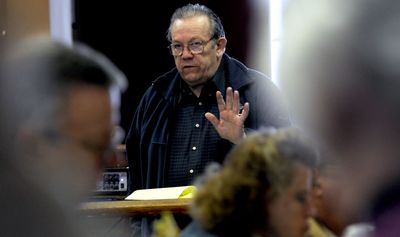Lawyer recounts legal rout of Aryan Nations

The Coeur d’Alene attorney who spearheaded the landmark civil lawsuit that bankrupted the Aryan Nations and its late leader, Richard Butler, in 2000 said Friday that the trial would not have been won without the “unfettered genius” of nationally known civil rights attorney Morris Dees.
“What do you do with a $35 lawsuit?” Norm Gissel asked a gathering of the Kootenai County Democratic Club. “All the other cases he had were death cases or torture cases, really outrageous. We had an outrageous set of facts, but no serious damages.”
The $35 value referred to the cost of an X-ray plaintiff Victoria Keenan had after the Aryan Nations members hit her in the ribs with a rifle. Keenan and her son, Jason, were chased, fired on and assaulted after passing the white supremacists’ property on July 1, 1998.
Gissel detailed strategic moves Dees, of the Southern Poverty Law Center in Alabama, made to turn the trial into one that delivered a $6.3 million verdict against the Aryan Nations, Butler and three of his followers.
First, Gissel said, Dees secured an affidavit from the judge saying he needed heavy security due to regular death threats he received. Thus the jury members saw police everywhere and when the trial ended each day, they saw the plaintiffs and their attorneys rush into waiting cars and dash away.
“The jury was watching this and knew we were under guard and it was dangerous,” Gissel said. “It was all theater, just theater.”
Additionally, Gissel said, Dees secured tape recordings of Butler and his companions making violent and racist statements. One “character witness” for Butler was taped telling a group that it was OK to kill African-Americans. That recording was used to impeach the witness, Gissel said, when he lied on the stand and said he hadn’t made statements that would incite violence. The attorneys were then allowed to play the recording twice, each time to horrified looks from the jury, he said.
Dees also managed to secure the early release from jail of a former Aryan Nations member willing to provide testimony that Butler had offered a bottle to make a bomb when he overheard the man and a companion talking about attacking a Coeur d’Alene human rights activist’s property.
The trial was scheduled for September, and the man wasn’t due to be released until October, Gissel said.
“For a regular attorney, that’s the end of that. This guy is in jail. Not Morris,” Gissel said. Dees went to the judge with a motion that said the man needed to be placed in his custody “for the good of the country.”
The trial “was metaphorically about all racist right-wing organizations versus America, in some sense,” Gissel said. “It was a cultural lawsuit to us because it had – win or lose – enormous cultural implications for us.”
A loss would have invited other racists worldwide to North Idaho, he said. A win would break built-up momentum and send a message about Kootenai County’s intolerance of racism.
Following Gissel’s speech, longtime human rights activist Tony Stewart said Dees drafted him to assist with the trial following the death of Dees’ jury consultant. Stewart said he called in about three dozen people from around Kootenai County to dissect the 72-person jury pool.
One man recognized another man’s name as someone he worked with who told racist jokes. That person was marked as undesirable for the jury. A drive past another potential juror’s home revealed “she had in her window a sign that said ‘Crime Busters.’ We said, ‘She’d be great on the jury,’ ” Stewart said to laughter.